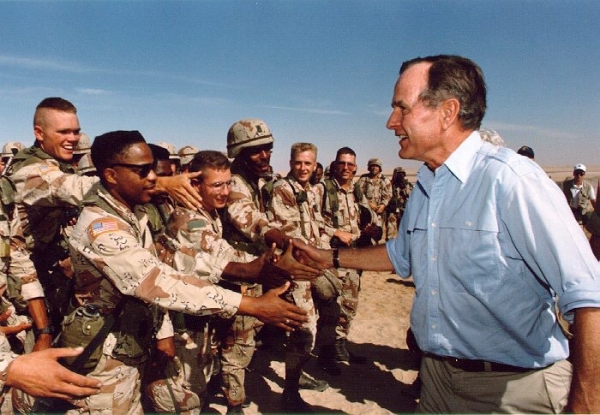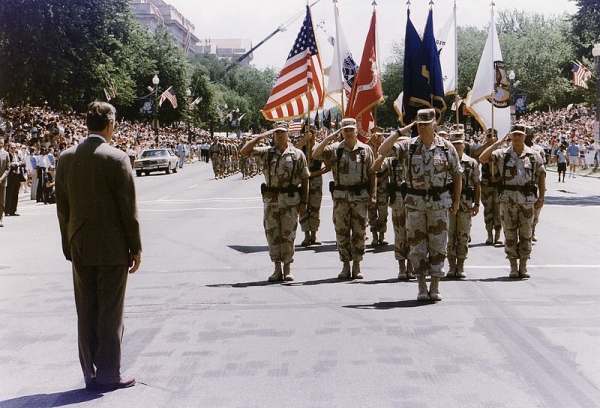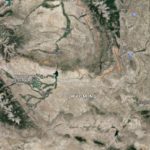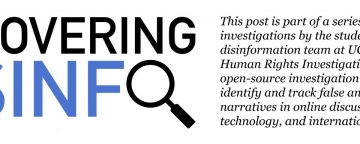Hank KaletBlockedUnblockFollowFollowingDec 7
George H.W. Bush, lionized by the press in death, began destabilization of Iraq and region

The 41st president of the United States, George H.W. Bush, was laid to rest this week — about 28 years following what many in the foreign-policy establishment call his greatest political triumph, but which should be more rightly seen as the beginning of one of America’s greatest disasters.
Bush was eulogized yesterday in glowing terms: A representative comment came from the historian Jon Meacham, a Bush friend and biographer, who called him “the last great-soldier statesman” and “our shield” in dangerous times, the AP said.
Funerals, of course, tend to be times when the dead are remembered fondly, and no one would expect those who spoke from the pulpit yesterday to offer anything but praise and humor. They offer an ideal vision of the recently deceased, even of public figures with decidedly mixed (at best) public records like President Bush, a vision that can color the way former presidents are sent into posterity.
Bush the diplomat, the skillful player on the international stage, just does not ring true given the damage his presidency left behind, particularly in the Middle East. In our popular histories, we tend to bifurcate the two Gulf Wars — the good Gulf War of Bush 41 and the failed Iraq War of Bush 43. This may be legally accurate, but I think it elides the way the two wars are linked and the continuum of hostility toward Iraq that began with Saddam Hussein’s invasion of Kuwait and continues in many ways.
Iraq had been, until the invasion, a recent American client state, armed to the teeth by the Reagan administration and counted on as a counter-weight against Iran — which Reagan also was arming (see Iran-Contra scandal). When Iraq stormed into Kuwait, it was met by world-wide diplomatic opposition and calls for withdrawal. Sanctions and a blockade were recommended, and other efforts to hem in Hussein and protect Saudi Arabia from potential threat were put on the table.
The talk quickly moved to war, which began after a diplomatic full-court press by U.S. Secretary of State Jim Baker that created a coalition of forces that contributed about 1 million troops (700,000 from the U.S.). The coalition was successful in removing Iraq from Kuwait, but the war’s legacy haunts us today.

The 1991 war, the late foreign correspondent Rupert Cornwall wrote in 2016, left a region in turmoil. While the war was a success diplomatically and on the battlefield, it left Hussein in power over a broken nation and began the unleashing of the sectarian competition that still engulfs much of the Middle East.
“Since 1991,” he wrote, “the region has been turned on its head: by the 9/11 attacks and the growth of non-state militant Islam; by the younger Bush’s invasion of Iraq in 2003; and by the Arab Spring, with its sad, unintended legacy of a collapsed Libya, an even more repressive military regime in Egypt, unspeakable tragedy in Syria, and the possibility of a generalised Sunni-Shia conflict across the region.”
The war, he reminds us, “represented Washington’s debut (into) direct military foray into the region’s sectarian politics. It has never really got out since. The dazzling triumph of American arms may have exorcised Vietnam’s ghosts, but it led to a belief that US power was irresistible, and the hubris that helped bring about the blunder of 2003.”
Bush 41 began this process. Bill Clinton intensified it through the imposition of sanctions and targeted bombings. And George W. Bush — Bush 43 — added the exclamation point, returning to Iraq in a war of choice that was built on lies and manipulation.
But we have to start with Reagan and the first Bush, as the Iraqi poet and scholar Sinan Antoon points out.
In a 2014 essay for The Washington Post, Antoon points to American intervention in Iraq as sharing blame with Saddam Hussein for Iraqi society and culture’s. “institutionalized militarization.” The United States, “despite gross human rights violations and the use of chemical weapons in the battlefield and against civilians,” chose “to sacrifice humanitarian interests at the altar of its own (perceived) security interests by providing generous financial and military support to the Iraqi regime.”
This decision was taken as Iraq and Iran engaged in a protracted and bloody war and which featured the use by Iraq of chemical weapons. Then came the invasion of Kuwait and the 1991 Gulf War, “ostensibly waged to liberate Kuwait,” which “caused the destruction of Iraq’s infrastructure and, in the words of then-U.S. Secretary of State James Baker, took the country ‘back to the pre-industrial age.’” Over the next 12 years, an Iraqi uprising was ignored by the United States — even as its president, Bush 41, was encouraging Iraqis to overthrow Hussein — and followed by “severe economic embargo” under both Bush and Clinton that “extended the destruction brought about by the bombing to every facet of life in Iraq.”
Iraq, a modern nation in nearly all respects pre-Gulf War, ceased to function, while only strengthening Hussein’s hold on power. “Instead of hurting the regime, it ended up strengthening its hold on society, but damaging and ending the lives of hundreds of thousands of innocent citizens.”
The 2003 Iraq War was just the final nail in Iraq’s coffin, as the American military and its allies destroyed much of what was left of the nation’s physical, political, and cultural infrastructure, which then unleashed long, pent-up sectarian anger, causing Iraq to fall into Civil War.
This is a simplified version of the history, and it is not meant to underplay the role Saddam Hussein played in the tragedy that befell Iraq, or to place specific blame at any individual leader’s feet. Bush, Bush and Bill Clinton share much of the blame — along with the permanent foreign policy establishment, a jingoistic U.S. press, and members of Congress from both parties — but it is rare when the elder Bush is called to account for the instability in the region. George H.W. Bush’s invasion of Iraq continues to be viewed as the good war, but it shouldn’t be. The impact on Iraq and on the region of the 1991 invasion continue to reverberate today.


























Connect with us